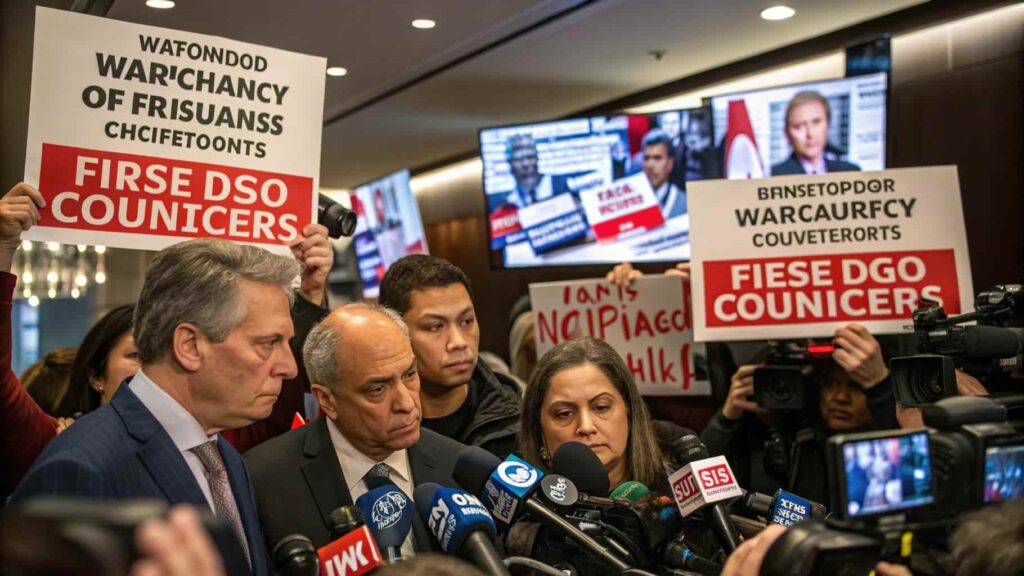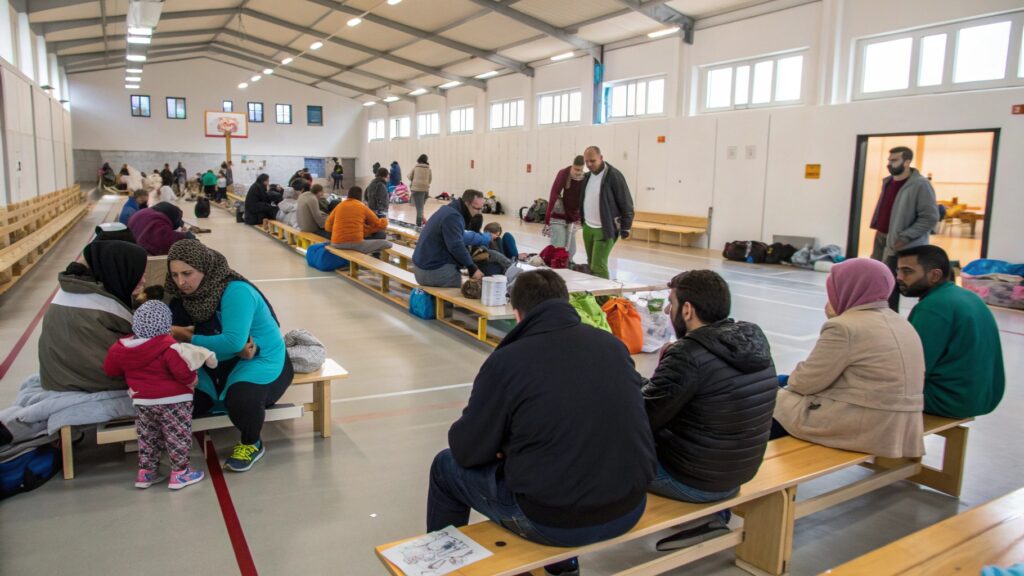The Doge HHS migrant housing contract has recently gained significant attention in U.S. policy circles. At the heart of this debate lies the agreement between the Department of Health and Human Services (HHS) and Family Endeavors Inc., which was tasked with maintaining emergency housing for asylum seekers.
While the goal was to ensure readiness for surges at the southern border, critics argue that millions were spent on facilities that remained largely unused. The controversy highlights deeper issues of efficiency, oversight, and humanitarian responsibility raising an important question: how should the U.S. balance cost control with compassion for those seeking refuge?
Background of the Doge HHS Migrant Housing Contract
The HHS contract, awarded to Family Endeavors Inc., was designed to create an “influx care facility” for migrant families and children during times of border surges.
Located in Texas, the facility was expected to accommodate up to 3,000 people at its peak. However, reports indicated that the shelter often remained empty while the organization continued to receive payments exceeding $18 million monthly.
DOGE, the Department of Government Efficiency, questioned this arrangement, arguing that taxpayers were funding a facility with minimal activity. Supporters, however, claimed that maintaining a “cold-ready” facility—prepared but not operational—was a necessary precaution for emergency response.
Transparency and Accountability Concerns

Public scrutiny intensified when watchdog groups and media outlets began highlighting the lack of transparency in how funds were being allocated. Critics demanded detailed utilization data to justify the expenditure. The controversy deepened when DOGE investigated the arrangement, citing inefficiencies and poor contract management.
Proponents countered that emergency readiness cannot always be measured in daily use. In their view, preparedness for sudden humanitarian influxes justified maintaining facilities on standby. This debate between efficiency and preparedness has become symbolic of broader tensions in U.S. immigration and budget policies.
Impact on Policy and Public Perception
The Doge HHS contract quickly became more than a bureaucratic issue—it evolved into a political and ethical discussion. Media outlets questioned whether the government was prioritizing fiscal discipline over humanitarian needs or vice versa. Lawmakers used the situation to argue both for and against increased oversight of federal spending on asylum-related infrastructure.
Meanwhile, nonprofit organizations involved in migrant aid expressed frustration at how political controversy overshadowed the urgent need for humane housing and care. For many asylum seekers, the debate meant continued uncertainty about when and how they would be provided shelter.
Contract Affects Asylum Seekers
At its core, the Dodge HHS migrant housing contract directly affects asylum seekers who rely on government-backed shelters during vulnerable moments. When facilities are underused or shut down, migrants may face delays in access to safe housing, medical care, and legal aid.Children, in particular, bear the brunt of inefficiencies.
Delays in housing placement can expose them to unsafe conditions at overcrowded border stations. Critics argue that the contract’s mismanagement demonstrates a gap between bureaucratic planning and on-the-ground humanitarian realities.A balanced solution would involve transparent oversight while ensuring that emergency facilities remain ready without wasting taxpayer funds.
Alternatives to the Doge HHS Contract

Exploring alternatives to the Doge HHS contract involves rethinking both funding models and operational frameworks. One potential solution is adopting a regional partnership model, where local governments, NGOs, and private entities share responsibility for migrant housing. This approach can improve flexibility and reduce dependency on single, large-scale contracts.
Another alternative involves modular housing units, which can be deployed and dismantled quickly according to need. These systems are cost-effective and prevent facilities from remaining idle. Moreover, community-based shelters and smaller, distributed facilities can deliver humane conditions while reducing logistical burdens on federal agencies.Such reforms could ensure that future contracts balance fiscal prudence with humanitarian responsiveness.
The Importance of Providing Adequate Housing for Asylum Seekers

Housing is not merely a logistical necessity—it’s a moral and humanitarian obligation. For asylum seekers fleeing violence, persecution, or poverty, access to safe shelter represents the first step toward dignity and recovery. Adequate housing protects vulnerable populations from exploitation, health crises, and trauma.
When the government invests in sustainable migrant housing, it reinforces international human rights principles and America’s image as a compassionate nation. Adequate shelter also supports public safety, as organized facilities prevent overcrowding and public health risks. The Doge HHS contract controversy thus reminds policymakers that fiscal oversight should never overshadow humane responsibility.
DOGE’s Broader Mission: Efficiency or Overreach?
The Department of Government Efficiency (DOGE) was created to promote accountability, streamline spending, and identify inefficiencies within federal programs. However, critics argue that DOGE’s investigation into the HHS migrant contract reflects potential overreach.
Some policymakers claim that DOGE is using high-profile cases to justify its existence rather than focusing on systemic solutions. Others view the agency as an essential watchdog that prevents misuse of taxpayer money.
Ultimately, whether DOGE represents efficiency or overreach depends on perspective: efficiency advocates see a commitment to fiscal discipline, while opponents fear bureaucratic intrusion into humanitarian affairs.
Financial and Ethical Dimensions of the Controversy

The financial controversy surrounding the Doge HHS migrant housing contract underscores a critical dilemma: how much is too much to pay for readiness? While the $18 million per month figure seems excessive, emergency response systems inherently require standby costs.
From an ethical standpoint, critics highlight that idle spending should never come at the expense of real-world needs—particularly when asylum seekers face unsafe conditions elsewhere. The incident pushes policymakers to balance the budget without neglecting compassion, reaffirming that government accountability must coexist with humanitarian purpose.
The Fallout and What Happens Next
Following mounting criticism and investigations, HHS eventually ended the contract with Family Endeavors. The fallout has left policymakers and watchdogs debating what lessons to draw.Going forward, experts recommend implementing performance-based contracts that link payments to measurable outcomes such as occupancy rates, quality standards, and response time.
Transparency portals could also allow the public to track spending in real time.For the affected asylum seekers, however, the immediate concern remains access to shelter and services. The episode serves as a reminder that bureaucratic failures can have human consequences, and reform efforts must prioritize both efficiency and empathy.
Lessons Learned and Path Forward
The Doge HHS contract episode reveals that crisis management requires a dual approach: fiscal oversight and humane readiness. Governments must learn to spend wisely without undermining preparedness. Improved coordination between agencies, stricter auditing mechanisms, and stronger community partnerships can ensure that emergency housing remains both ethical and efficient.
Ultimately, the controversy could serve as a catalyst for positive change reshaping how the U.S. manages humanitarian contracts, preventing waste, and preserving the dignity of those seeking safety on American soil.
FAQs
What was the Doge HHS migrant housing contract?
A federal agreement between HHS and Family Endeavors to maintain emergency migrant housing.
Why was it controversial?
Because millions were paid for facilities that reportedly remained unused.
Who investigated the contract?
The DOGE Department of Government Efficiency—questioned the contract’s effectiveness.
How did it impact asylum seekers?
Delays and limited access to safe shelters affected migrant families.
What reforms are being suggested?
Performance-based contracts, transparency, and community partnerships to ensure accountability.
Conclusion
The Doge HHS migrant housing contract stands as a cautionary tale of conflicting priorities—efficiency versus empathy, oversight versus urgency. While the intent behind the contract was noble, its execution exposed weaknesses in government planning and accountability. Moving forward, success depends on creating adaptable, transparent, and humane housing systems that serve both the taxpayer and the asylum seeker. By learning from this episode, the U.S. can ensure that its policies reflect both fiscal responsibility and moral leadership, protecting the most vulnerable without compromising public trust or economic integrity.
Related Posts:

